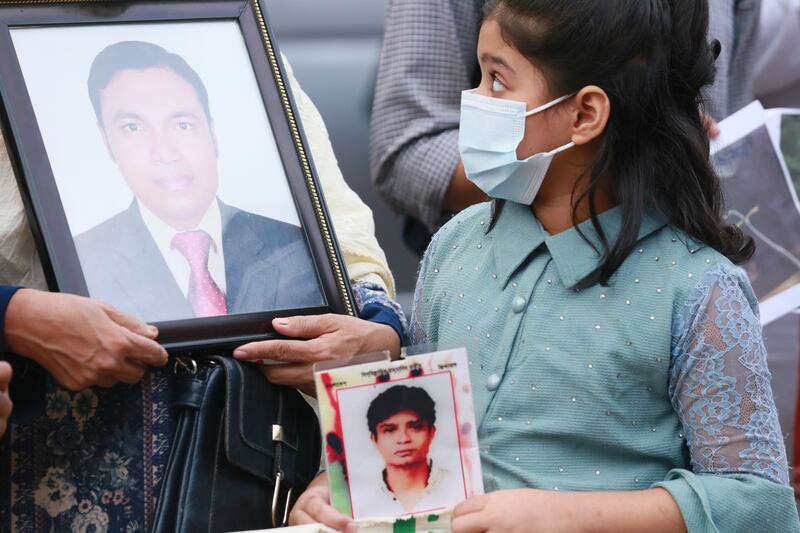The brother of a man who vanished in 2013 says police came to his home earlier this year and tried to force his father to sign a blank document, confirming U.N. allegations that Bangladesh’s government is trying to silence families of presumed victims of enforced disappearances.
Police responded by saying the incident was part of their investigation into the disappearance of Mahbub Hasan, a leader of Jatiyatabadi Chatra Dal, the student wing of the opposition Bangladesh Nationalist Party (BNP).
“Police came to my home in the Sabujbagh area in Dhaka in January and tried to force my father to sign a blank document, but he refused. After local people gathered in front of my house, police left,” Hasan’s brother, Shakil Khan, told BenarNews on Tuesday.
“On Feb. 6, an officer of the detective branch of police called me and said they are investigating my brother’s issue. The officer asked me to meet him at his office whenever he calls,” Khan said.
Hasan’s and other families linked to victims of enforced disappearances have faced increasing incidents of harassment since December 2021, according to 16 United Nations human rights experts.
The experts urged the government to end such reprisals, noting that the homes of at least 10 relatives of missing people had been “raided late at night” since the United States imposed sanctions on Bangladesh’s Rapid Action Battalion (RAB) security force at that time.
In a statement issued from Geneva on Monday, the group alleged that the Bangladeshi government was retaliating against activists and families of missing people who have worked with international organizations to bring enforced disappearances to light.
“During the raids, relatives were intimidated, threatened and forced to either sign blank sheets of paper or pre-written statements indicating that their family member was not forcibly disappeared and that they had deliberately misled the police,” the U.N. experts said.
“This is unacceptable,” the experts said. “RAB and other security agencies should not be shielded from scrutiny and criminal responsibility.”
This kind of intimidation could deter others from reporting on issues of public interest and from cooperating with rights activists, the experts said, while calling for an immediate end to the raids.
RAB was founded in 2004, and charged with internal security, intelligence gathering related to criminal activities and government-directed investigations, according to the U.S. Treasury. It is accused of more than 600 enforced disappearances in the past 12 years, according to Washington.
Bangladesh police denied the experts’ allegations.
“There is no incident of harassing any family of missing persons. Police personnel … sometimes visit the residences of missing persons as a part of an investigation,” Md. Kamruzzaman, an assistant inspector general at police headquarters, told BenarNews. “Police act with professionalism.”
Another police official said officers had good reason to make such visits.
“Police sometimes visit the houses of missing persons to check whether the missing person was back home or not as sometimes missing people return,” Mohammad Faruk Hossain, the Dhaka Metropolitan Police’s deputy commissioner for media and public relations, told BenarNews.

‘Harassing the families’
Despite those denials, families of some victims told BenarNews that police were still hounding them.
“Police are harassing the families repeatedly over the phone or visiting their houses,” said Afroza Islam Akhi, a coordinator with victims group Mayer Daak.
“Law enforcers should behave with the families of enforced disappearance victims carefully as they are passing days with serious stress. Instead of showing sympathy, authorities can be threatening,” said Afroza, whose brother, BNP leader Sajedul Islam Sumon, disappeared in December 2013.
Shilpi Akhter, whose brother, Farid Ahmed Raju, disappeared one month later from the southeastern Lakshmipur district, expressed similar concerns.
“Police visited our house at Chandraganj area twice – once during the day and another at night – just 15 days ago. They asked my family to go see someone at the police station, but we did not go as we were not convinced by their behavior,” she told BenarNews.
Mosleh Uddin, officer-in-charge of Chandraganj Police Station, said people should have no concerns about the investigations.
“I have visited houses of three missing persons in my area recently,” he told BenarNews. “I visited the houses just to collect information on whether the missing persons are back home or not.”
Nur Khan Liton, general secretary of human rights organization Ain-O-Salish Kendra (ASK), also confirmed the U.N. allegations.
He proposed that the government establish guidelines for police and other law enforcers to behave with the families and demanded it form an independent commission to probe all enforced disappearance cases.
“We observed with concern that the families of enforced disappearance victims are suddenly facing intimidation by law enforcers over the last few months,” he told BenarNews.
